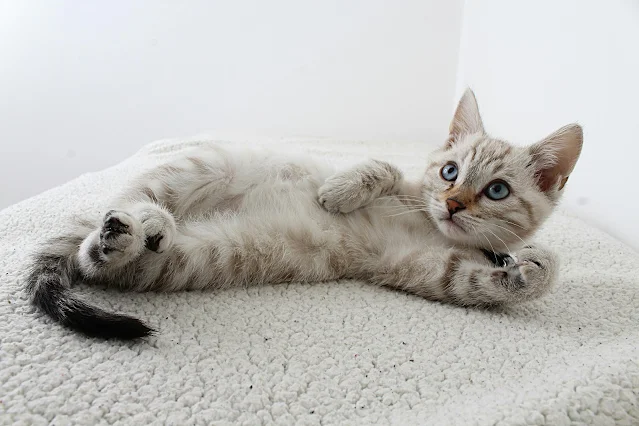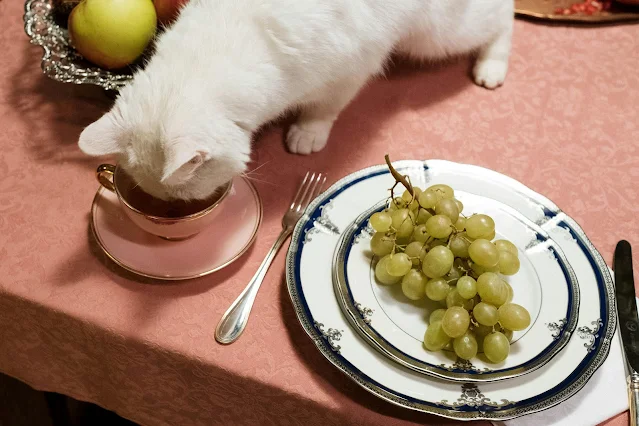Vomiting or Regurgitation?
It's essential to differentiate between vomiting and regurgitation.
Vomiting is a stomach issue, while regurgitation is an esophageal problem. When vomiting, you'll notice the cat's abdomen contracting, and the cat will appear restless, looking quite uncomfortable. What's expelled is usually in puddles. With regurgitation, you'll see the cat lowering its head and effortlessly bringing up the material. Typically, regurgitated material appears elongated.
Causes to Cat Vomiting
Let's dive into a few of the common reasons for this.
1. Seasonal Changes
During transitional seasons, when the weather fluctuates between cold and hot, bacteria can thrive and multiply easily. If insulation isn't properly maintained, cats can easily catch colds, leading to vomiting. During these transitions, it's essential to pay attention to keeping your cat warm. Also, avoid letting your cat drink tap water, especially if they are young and have a weaker gastrointestinal system.
2. Hairball
When a cat's stomach accumulates hairballs to a certain extent, they'll start vomiting them up.
It's nothing to worry too much about, but it's important to keep an eye on it. If the hairballs get too big and can't be vomited up, pet owners should consider giving their cat some hairball remedy paste or similar products. It's also a good idea to focus on having cat grass at home regularly.
3. Parasites
If there's a heavy infestation of parasites in a cat's stomach, they may instinctively seek out leaves or grass to change the acidity of their stomach acid (pH) and induce vomiting. Upon observing their vomit, you may notice many parasites. In such cases, it's crucial to deworm your cat promptly.
Cats need to be dewormed externally every month and internally every three months. If there are internal parasites, it can lead to nutritional deficiencies in cats, making it difficult for them to gain weight no matter how they're fed. Additionally, vomiting may occur. If visible parasites are found in the vomit, it's crucial to seek treatment at the vet as soon as possible. Pet owners should also remember to deworm their cats regularly as a part of their routine care!
4. Improper Feeding
Suddenly changing a cat's diet or frequently offering various snacks can cause gastrointestinal discomfort and vomiting.
Just like us, cats can feel miserable when they eat too much. If they gorge themselves, it can lead to vomiting. Keeping an eye on portion control can help avoid this issue altogether.
5. Empty stomach vomiting
Some cat parents may be a bit lazy with feeding, dumping a whole bunch of kibble at once, leaving the kitty with nothing to munch on later. This can lead to overeating followed by an empty stomach, triggering excess stomach acid and, you guessed it, vomiting. If this happens, it's time to be more mindful about feeding schedules—smaller meals more often. If the dry heaves become a regular thing, it's best to get a vet check-up.
6. Folate Deficiency
When cats lack folate, they may often eat leaves and grass to produce nutrients internally. Later, they'll vomit out the indigestible parts along with other stomach contents.
7. Illness
Vomiting may indicate various diseases, such as foreign objects, hairballs, or typical gastric contents. Cats with severe gastritis, stomach ulcers, tumors, certain infectious diseases, or ingested foreign objects may vomit.
8. Other Health Issues
Cats may vomit after drinking water, sometimes mixed with blood, accompanied by foul-smelling diarrhea and fever. This could be due to feline panleukopenia (feline infectious enteritis), feline viral infections, certain internal diseases (including heart disease and kidney disease), or eating spoiled food or carrion.
If a cat exhibits vomiting but cannot expel anything, sometimes accompanied by rapid breathing, fever, frequent changes in lying position, persistent vomiting, and sometimes even vomiting fecal-like material or difficulty defecating or cessation of defecation, it could be indicative of intestinal obstruction, intestinal torsion, or intestinal obstruction.
Conditions like jaundice and pancreatitis are relatively common liver problems in cats. If vomiting is due to liver issues, you might notice bile in the vomit, loose and unformed stools, and even diarrhea. So, it's important to avoid fatty foods and treats and make sure to schedule regular vet check-ups to keep an eye on your kitty's health.
If you're still puzzled about why your beloved kitty is throwing up,
it's best to take them to the nearest vet clinic. Let the pet doctor
diagnose and solve the issue for you.



Comments
Post a Comment